Stratford-on-Avon, Warwickshire
Up to 1834
A parliamentary report of 1777 recorded parish workhouses in operation at Stratford upon Avon (for up to 50 inmates), Old Stratford (40), Preston Baggott (20) and Welford .
In the eighteenth century, a row of cottages on Cottage Lane at Hathaway Hamlet, dating from the previous century, was converted into a workhouse and almshouses for the parish of Old Stratford.
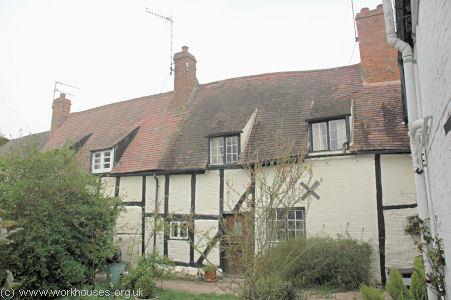
Stratford-on-Avon Hathaway Hamlet workhouse, 2007.
© Peter Higginbotham.
In 1832, Welford had a workhouse whose inmates comprised four males, aged from 4 to 86 years, and five females, aged from 4 to 78 years.
After 1834
Stratford-on-Avon Poor Law Union was formed on 30th May 1836. Its operation was overseen by an elected Board of Guardians, 44 in number, representing its 36 constituent parishes as listed below (figures in brackets indicate numbers of Guardians if more than one):
County of Warwick:
Alveston, Atherstone-on-Stour, Bearley, Beaudesert, Billesley, Binton, Charlecote, Claverdon, Combroke [Combrook], Compton Verney, Eatington, Fulbrook, Hampton Lucy or Bishop's Hampton, Kineton (2), Langley, Luddington, Loxley, Moreton Morrell, Newbold Pacey, Preston Bagot, Snitterfield (2), Stratford on Avon (4), Old Stratford (2), Temple Grafton, Wellesbourne Hastings, Wellesbourne Mountford, Whitchurch, Wolverton.
Counties of Warwick and Gloucester:
Wootton Wawen, Welford, Weston-on-Avon.
County of Worcester:
Alderminster.
County of Gloucester:
Clifford Chambers, Dorsington, Marston Sicca, Preston-on-Stour.
Later Additions (from 1894): Bickmarsh, Drayton, Milcote,.
The population falling within the Union at the 1831 census had been 18,745 with parishes ranging in size from Billesley (population 24) to Stratford-on-Avon itself (3,488). The average annual poor-rate expenditure for the period 1833-35 had been £9,404 or 10s.0d. per head of the population.
The Stratford-on-Avon workhouse was built in 1837 at a site on the west side of Arden Street to the west of the town centre. The Poor Law Commissioners authorised an expenditure of £4,380 on construction of the building which was to accommodate 200 inmates. Designed by J Bateman and G Drury, it followed the popular cruciform or "square" plan with an entrance block at the front, behind which lay the four accommodation wings radiating from a central hub, creating yards for the different classes of pauper (male/female, old/young). The location and layout of the site is shown on the 1905 OS map:
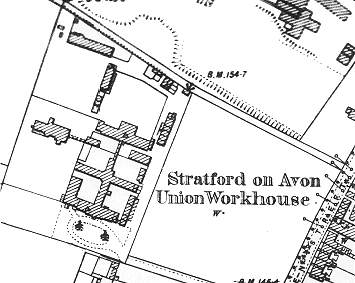
Stratford-on-Avon site, 1905.
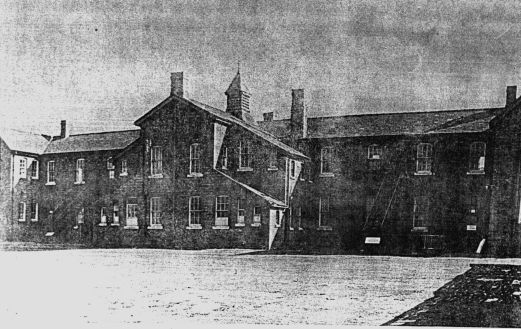
Stratford-on-Avon from the north.
courtesy of Shakespeare Birthplace Trust.
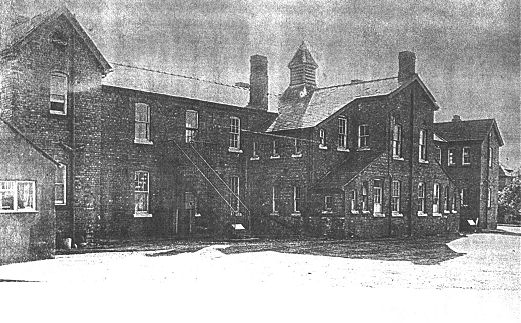
Stratford-on-Avon from the north-east.
courtesy of Shakespeare Birthplace Trust.
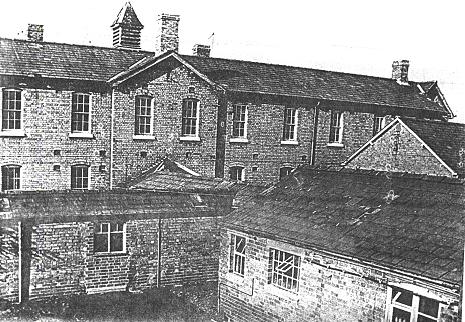
Stratford-on-Avon central portion from the south-west.
courtesy of Shakespeare Birthplace Trust.
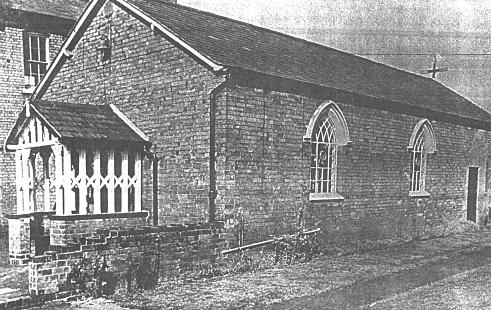
Stratford-on-Avon chapel from the south-west.
courtesy of Shakespeare Birthplace Trust.
A photograph of 1902 shows all the staff, residents and Board of Guardians arranged in front of the workhouse.
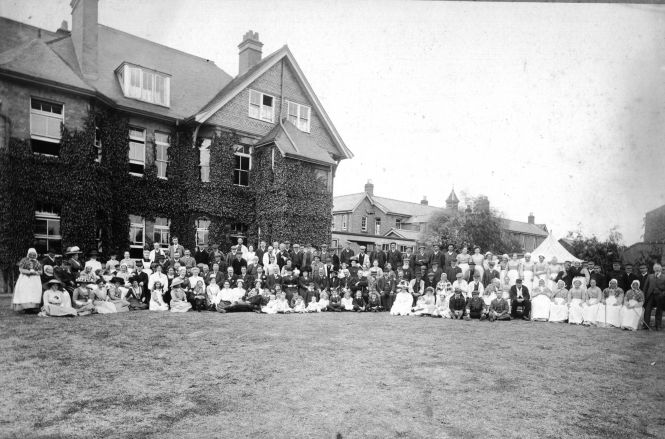
Stratford-on-Avon c.1902.
courtesy of Edwin Pickett.
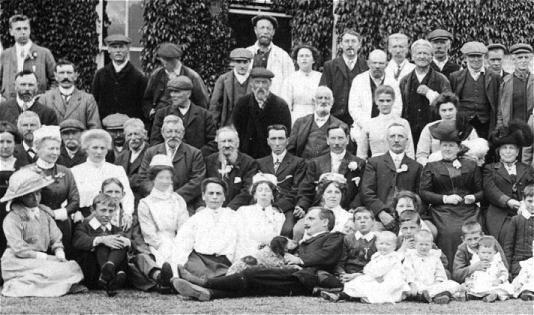
Stratford-on-Avon c.1902 (detail).
courtesy of Edwin Pickett.
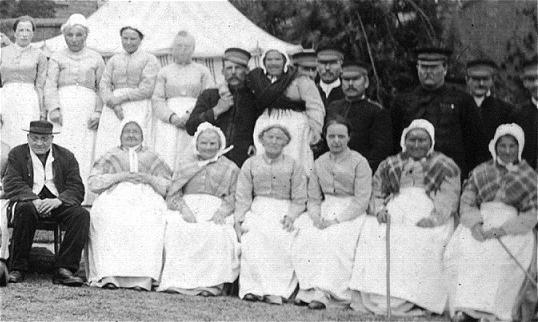
Stratford-on-Avon c.1902 (detail).
courtesy of Edwin Pickett.
The former workhouse later became Stratford-on-Avon Hospital. Almost all of the workhouse buildings have now been demolished. Amongst the few remaining structures is the casuals' block at the north-west corner of the site.
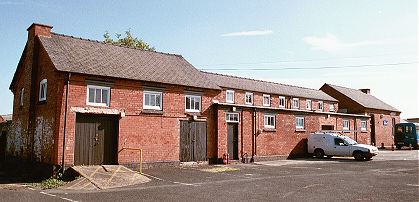
Stratford-on-Avon casuals' block from the south-west, 2000.
© Peter Higginbotham.
Stone-breaking cells were located at the rear of the block. These still have the horizontal grids through which stone had to be passed after being broken into sufficient small pieces. The cells had an unusual design of interlaced metal grid which apparently served both as an unglazed window and also to allow unbroken stone to be loaded through.
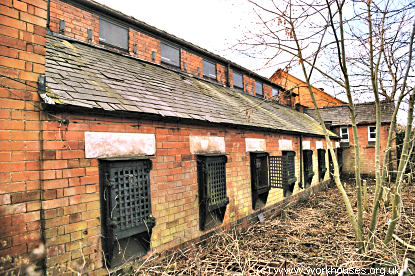
Stratford-on-Avon casuals' block from the north-east, 2005.
© Peter Higginbotham.
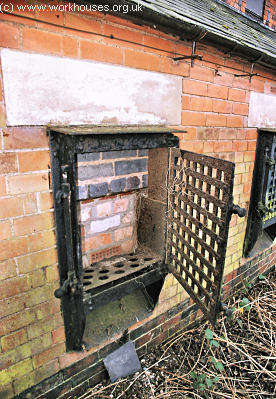
Stratford-on-Avon stone-breaking cell, 2005.
© Peter Higginbotham.
From 1896 to 1927, the Master of the Stratford workhouse was Daniel Pickett, with his wife Eleanor as Matron. Daniel's great-grandson, Edwin Pickett, has researched the life of his great grandfather and has kindly allowed the results of his investigations to be included below.
DANIEL PICKETT (1858 — 1931)In the 1881 census 22 year old Daniel Pickett was listed as residing in Cheddington Bucks — his place of birth in 1858 — in the household of his grandfather, Daniel Millins. His father, William Hemmings was deceased by this time but had been a schoolmaster. Also in the household were his mother and sister. Daniel was described as being a boot and shoe mender by trade. In fact, he had been apprenticed into the saddlery business but had the misfortune to break a leg in an accident and was unable to follow his trade. In 1891 details from the census show that Daniel was living at the 'workhouse' in Stoke Next, Guildford where he was employed under the master, a Duncan MacDonald, as a porter. A few weeks later, on 25th June, he was married to Eleanor Jones in the parish church of Holy Trinity, Guildford, Surrey. He had entered the 'Poor Law' profession in Guildford around 1885 and from there he went to Kingsclere, Hampshire as assistant master, gaining promotion an the death of the master. This move must have been shortly after his marriage as in 1892 Thomas William was born and his place of birth was stated as 'poor law institute', Kingsclere. In 1896, Daniel and Eleanor were selected to succeed Mr and Mrs Collingwood as Master and Matron at Stratford-on-Avon Union. Gardening was a favourite pursuit of Daniel and under his fostering care the Union gardens became not only a thing of beauty but a paying proposition. His grand daughter 'Nell' (now 87) vividly remembers visiting the Workhouse which she describes as like a large country house. The gardens are remembered along with the asparagus which was received each year in Yorkshire, and picking gooseberries and other fruit from the bushes. One of the forms of employment in the workhouse was the making of matresses, pillows and eiderdowns in the 'feather room.' In October 1926 after completing 32 years in Stratford and 42 years in Poor Law Daniel retired and was presented with a cheque for £17.2s.0d while in appreciation of the exceptionally able manner in which Eleanor had discharged her duties as Matron, four years were added to her length of service for the purpose of calculating her superannuation allowance. This severance from official duty came as a great wrench to Daniel who, it may be said, lived for his Poor Law work. The following is a reproduction of an article printed in the Stratford Herald dated 7th October, 1927 on the occasion of the retirement of Daniel and Eleanor Pickett from their post of joint Master and Matron of the Stratford workhouse.
Daniel died on Saturday, 26/12/1935 — 'Boxing day'- at his residence — 'Cassiobury', 53 Loxley Road. The end came peacefully following a mild seizure. He left a widow and two sons — Tom who was master at the Pontefract Union and Jack who was Asst. master of the Turnshurst Road Institute, Stoke-on-Trent. The interment took place on the 29th at the Borough cemetery in Evesham Road (plot no. 4420, directly in front of the chapel). The first part of the service being read at the Parish Church by Canon Melville. The mourners were Mrs Pickett (widow), Mr & Mrs Tom Pickett. Mr & Mrs Jack Pickett, Mrs and Mrs Cedric Margetts (nephew & niece), Mrs Avery (sister-in-law), Miss M Hughes and Mr H B Walters. Among those who followed were Mr T Sankey (Chairman of the Guardians Committee). Mr P W Foster (Master at Poor Law Institute), Mr W Ellis (Relieving Officer) C. Smith and C Hollick (representing the Shakespeare Lodge, RAOB), Mr E Drinkwater (representing the Clopton Lodge, AOD), Nurses Matlock and Smith from the Poor Law Infirmary and many others. An obituary in The Stratford Herald dated Friday 1st 1932 stated:
It would seem that contrary to the popular view of poor law institutions No 50 Arden Street was a place in which the unfortunates of Stratford-on-Avon could truly find some sanctuary and was a testament to the fact that one good man (backed by a good wife) could make a difference to the lives of so many. However, as all too often happens in genealogy, more comes to light. Although the two newspaper articles quoted earlier show the Stratford workhouse in a much more favourable light than is normal for such institutions it was still particularly pleasing to obtain an original visitors book from the Stratford workhouse as this contained numerous entries that served only to confirm the favourable view.
|
Staff
Inmates
Records
Note: many repositories impose a closure period of up to 100 years for records identifying individuals. Before travelling a long distance, always check that the records you want to consult will be available.
- Warwickshire County Record Office, Priory Park, Cape Road, Warwick CV34 4JS. Holdings include: Guardians' minute books (1922-30); accounts (1921-20).
- Shakespeare Birthplace Trust Records Office, Henley Street, Stratford-upon-Avon, Warwickshire CV37 6QW. Holdings include: Guardians' minute books (1836-42, 1848-1922, 1930-32); Various workhouse records (1903-28, includes admissions and discharges, indoor relief lists, births and deaths); Workhouse plans (1836-1902).
Bibliography
- Higginbotham, Peter The Workhouse Encyclopedia (2014, The History Press)
Links
- None.
Acknowledgment
- Grateful thanks to Edwin Pickett his contribution to this page, and to the Shakespeare Birthplace Trust for use of pictures.
Unless otherwise indicated, this page () is copyright Peter Higginbotham. Contents may not be reproduced without permission.


